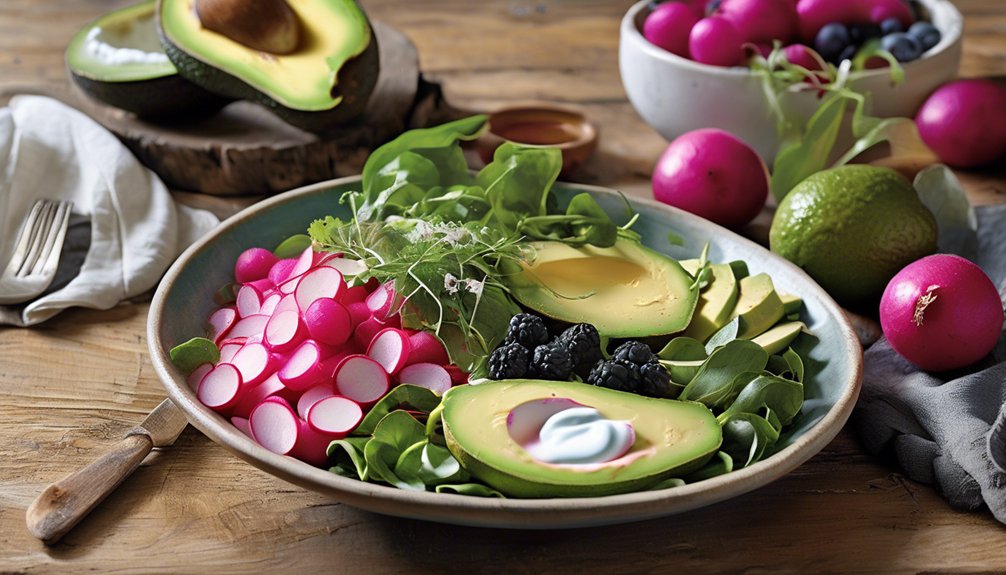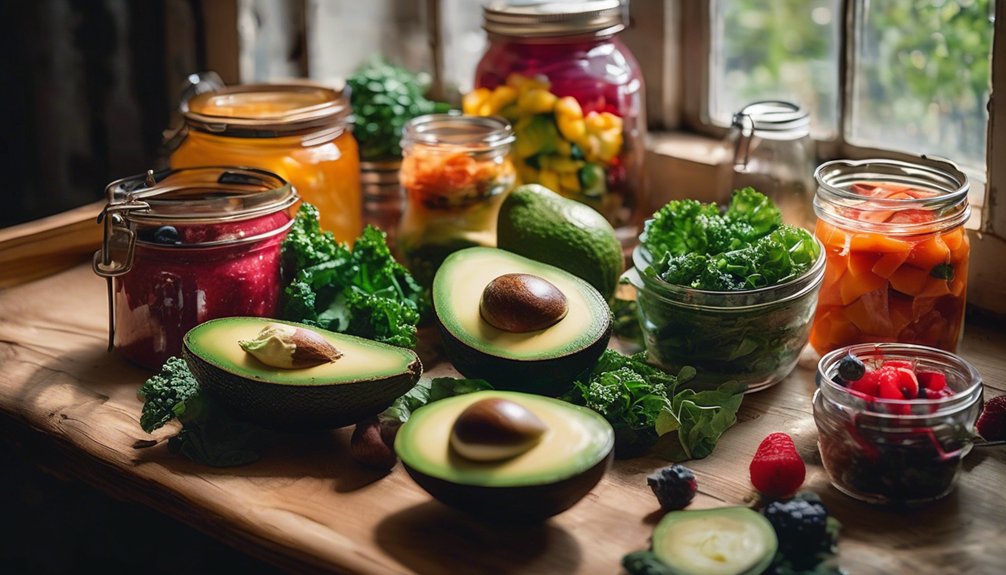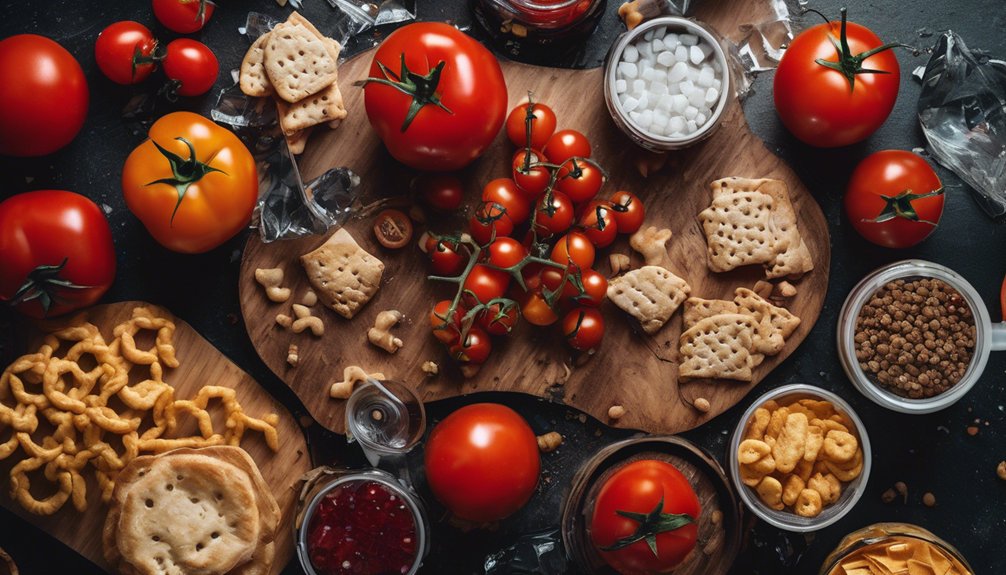Gut Health and Your Diet
Did you know that about 70% of your immune system resides in your gut? This statistic highlights the importance of maintaining gut health, as it plays a crucial role in your overall well-being. Your diet directly impacts the microbiome within your digestive system, which can either support or hinder your health. Understanding how to nourish this complex ecosystem is essential for optimizing your physical and mental health. Let's explore what you can do to achieve a healthier gut.
Key Takeaways
- A diverse diet rich in fiber, fruits, and vegetables supports a healthy gut microbiome and enhances digestion.
- Incorporating fermented foods like yogurt and kimchi introduces beneficial probiotics that aid digestive health.
- Consuming prebiotic foods such as garlic and onions nourishes beneficial gut bacteria, promoting a balanced microbiome.
- Limiting processed sugars and artificial additives helps prevent disruption of gut microbiome balance and reduces inflammation.
- Regular intake of whole grains and high-fiber foods lowers the risk of chronic diseases and supports optimal gut function.
Understanding the Gut Microbiome
When you think about your overall health, it's essential to consider the gut microbiome, as it plays a crucial role in digestion, immunity, and even mental well-being.
This complex community of microorganisms thrives in your digestive system, and maintaining gut diversity is vital for a balanced microbiome. A rich variety of gut bacteria enhances your body's ability to process nutrients, fight infections, and regulate mood.
When your microbiome balance is disrupted, you may experience digestive issues, inflammation, or even anxiety.
To foster a healthy microbiome, focus on a diverse diet rich in fiber, fruits, and vegetables. Incorporating fermented foods can also support this balance, ensuring your gut remains resilient and functional for your overall health.
The Role of Probiotics in Digestive Health
Probiotics, often referred to as "good bacteria," play a significant role in maintaining digestive health.
By incorporating probiotics into your diet, you can experience a range of probiotic benefits that enhance your overall well-being. Fermented foods are excellent sources of these beneficial bacteria, and adding them to your meals can make a real difference.
Here are some key reasons to include probiotics in your diet:
- They help restore balance in your gut microbiome.
- They can alleviate digestive discomfort and bloating.
- They support your immune system by enhancing gut health.
- They may improve nutrient absorption from your food.
Embracing probiotics through fermented foods can lead to a happier, healthier gut, and you'll likely feel the difference!
Importance of Dietary Fiber
Dietary fiber is a crucial component of a balanced diet that significantly impacts your gut health. Incorporating a variety of fiber sources, like fruits, vegetables, whole grains, and legumes, can help maintain regular bowel movements and prevent constipation.
The benefits of fiber extend beyond digestion; it also supports the growth of beneficial gut bacteria, enhancing your microbiome. These fibers act as prebiotics, fueling the good bacteria that keep your gut balanced and healthy.
Additionally, a high-fiber diet can lower your risk of chronic diseases, such as heart disease and diabetes. By prioritizing fiber in your meals, you're not just nourishing your body; you're fostering a thriving gut environment that contributes to your overall well-being.
Foods to Include for a Healthy Gut
To maintain a healthy gut, incorporating specific foods into your diet is essential. Focus on foods that nourish your gut flora and promote digestion. Here are some key options to include:
- Fermented foods: Think yogurt, kefir, sauerkraut, and kimchi, which introduce beneficial bacteria to your gut.
- Prebiotic sources: Foods like garlic, onions, leeks, and asparagus help feed those good bacteria, enhancing their growth.
- Whole grains: Oats, barley, and quinoa are rich in fiber, supporting digestion and gut health.
- Fruits and vegetables: Berries, bananas, and leafy greens provide vital nutrients and antioxidants that keep your gut lining healthy.
Foods to Avoid for Optimal Gut Health
What foods should you steer clear of to maintain optimal gut health? To support your digestive system, you'll want to limit processed sugars and artificial additives.
These ingredients can disrupt your gut microbiome, leading to imbalances that may cause discomfort or inflammation. Processed sugars, in particular, fuel harmful bacteria, while artificial additives can irritate your gut lining.
Instead of these harmful options, focus on whole, nutrient-dense foods that nourish your body.
It's also wise to watch out for highly processed foods, which often contain hidden sugars and additives. By making these small adjustments in your diet, you can create a healthier environment for your gut, enhancing your overall well-being and vitality.
Your gut will thank you!
Mindful Eating Practices
Maintaining gut health goes beyond just avoiding harmful foods; it also involves how you eat. Practicing mindful meals and intuitive eating can significantly impact your digestion and overall well-being.
Here are some strategies to incorporate:
- Slow down: Take your time to chew and savor each bite.
- Limit distractions: Eat without screens or interruptions to focus on your food.
- Tune in to hunger: Listen to your body's signals to guide when and how much you eat.
- Reflect on choices: Consider how certain foods make you feel, fostering a deeper connection to your dietary habits.
Simple Recipes for Gut-Friendly Meals
Incorporating gut-friendly meals into your diet can be both simple and delicious. Start with a basic fermented foods bowl: combine yogurt, sauerkraut, and sliced avocado over quinoa. This meal not only packs probiotics but also provides essential nutrients.
For an easy meal prep option, try a vegetable stir-fry with garlic, ginger, and a splash of tamari. Add tempeh for extra protein and fermented goodness.
You can also whip up a smoothie with kefir, spinach, and frozen berries to boost your gut health on the go. Remember, cooking with whole foods and incorporating more fermented items can transform your meals while nurturing your gut.
Embrace these simple recipes for a healthier, happier you.
Frequently Asked Questions
Can Stress Affect Gut Health and Microbiome Balance?
Yes, stress can significantly impact your gut health. Your stress response might reduce microbiome diversity, leading to imbalances that affect digestion and overall well-being. Managing stress is essential for maintaining a healthy gut environment.
How Long Does It Take to Improve Gut Health?
Improving gut health varies, but with dietary changes and probiotic supplements, you can often notice positive effects within a few weeks. Consistency is key, so stick with your new routine for lasting benefits.
Are There Age-Related Changes in Gut Health?
As you age, your gut's like a garden losing its vibrant colors; gut aging impacts microbiome diversity significantly. This shift can lead to various health issues, so staying informed is key for maintaining your well-being.
Can Antibiotics Permanently Damage Gut Microbiome?
Yes, antibiotics can disrupt your microbiome, leading to significant changes. While many people experience microbiome recovery over time, some may face lasting effects. It's essential to monitor your gut health and consider probiotics during recovery.
How Do Genetics Influence Gut Health?
Genetic predisposition significantly influences your gut health by affecting microbial diversity. Certain genes can determine how your body interacts with various microbes, ultimately shaping the balance and function of your gut microbiome. Understanding this connection is essential.
Conclusion
In conclusion, nurturing your gut health through diet is essential for overall well-being. By choosing fiber-rich foods, incorporating probiotics, and avoiding processed sugars, you can create a thriving gut microbiome. This not only supports digestion but also enhances mental health. Remember, what you eat plays a pivotal role in shaping your gut environment. So, embrace diverse, nutrient-dense foods and practice mindful eating to unlock the full potential of your gut health for a happier, healthier life.












